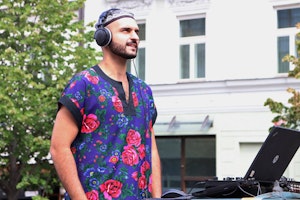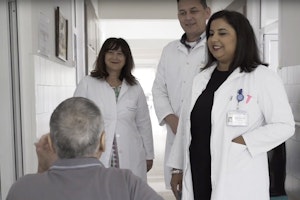Q&A: The Open Society Foundations in a Changing Europe

Five years since establishing the Open Society Initiative for Europe, regional director Jordi Vaquer assesses how the continent has changed since. The Open Society Foundations promote human rights, accountable government, and justice in Europe, allocating $65 million to that work in 2017.
You joined the Open Society Foundations in 2012. Why did the organization decide to establish the Open Society Initiative for Europe at that time?
Within the organization, there was a clear sense that the 2008 economic crisis had also created a democratic crisis. Institutional loans bailed out entire countries with conditions that severely limited the power of elected institutions—and therefore of the people—to decide their own fate, particularly in Greece. This erosion of democracy was a concern; the social and political rights of millions were being curtailed.
The way in which the economic crisis was managed—ignoring, silencing, or circumventing the will of people—bred disappointment, a catastrophic decline in trust, and the austerity politics which have hurt so many people. Decisions on political spending were being made by the elites that failed to prevent the crisis—the very same people who created it. The European Union itself was questioned, and it looked like the progress in integration and in creating a political space defined by democratic principles that had been made over the past generation could be reversed.
So it was the European crisis and the Eurozone crisis that triggered the creation of Open Society Initiative for Europe. Our aim—then and now—was to reinvigorate an embattled European project, put the voices of the people most affected back at the center of political decision-making, and ensure their rights are protected.
How did Europe get to where it is today, with a surge in support for populist and nationalist parties and an increase of xenophobia?
Many Europeans reacted to the economic crisis and its fallout by rejecting fundamental aspects of the political systems which were in place at the time. In that situation, a window of opportunity opened for political movements eager to challenge the mainstream; unfortunately, in most countries, populist and nationalist alternatives throve fastest and were most successful. Moreover, the nationalist narratives were fueled by two major new developments.
What were those two developments?
Firstly, the uncontrolled arrival of well over one million people into Europe, many of them refugees. Secondly, and separately, the eruption of a new wave of terror attacks on European soil. Both offered opportunities that xenophobic populists have been exploiting for their advantage, linking one issue to the other.
But we know that those attacks have mostly been committed by people who had grown up in Europe. Frustrated, angry young people, who feel rejected, ignored, or economically disadvantaged in the places where they grew up, have been recruited or decided to resort to violence on their own. Xenophobic reactions that blame entire communities only deepen divisions and aggravate the conditions that constitute fertile ground for this kind of radicalization.
Given this state of play, what role do you see for Open Society in Europe today?
The Open Society Foundations have always focused on the protection of human rights and civil liberties, and this remains the focus of our work today. A good example of this is our involvement in Greece, which was the first large-scale initiative of what was then the newly created Open Society Initiative for Europe. At the start of the Greek crisis, fundamental rights and freedoms were severely violated. We’ve funded organizations in Greece that protect those rights—and we continue to do so.
In addition to our traditional focus on rights and liberties, however, we aim to contribute to Europe’s democratic renewal. We think we can play a useful role in three ways.
What are the three ways Open Society Initiative for Europe can be helpful in fostering a revival of democracy in Europe?
One is our focus on particular minorities or vulnerable groups, funding their organizations and initiatives, which give them protection and a voice. Our help for Roma groups is perhaps the best known example of that, but we have also paid attention to the role of older people in advancing open society in a continent that is aging; to the way in which parents, teachers, and students can transform schools into engines of inclusion and openness; to the groups suffering from multiple discrimination, such as migrant sex workers or LGBTI individuals who belong to religious minorities.
Our second important role is to help the public understand the connection between the violations of the rights of minority groups and the violations of the rights of the broader population. Throughout history, we’ve seen that surveillance, profiling, restrictions on the media and public speech, shrinking space for civil society organizations and other worrying trends often start by targeting minorities, but soon they extend to a much broader section of the population. For example, measures adopted to fight terrorism resulted in mass profiling of entire communities—Muslim communities in Western Europe, all foreigners in Poland—but also putting environmental activists under house arrest in France, sentencing a Syrian refugee to 10 years for protesting in Hungary, or jailing puppeteers in Spain.
Finally, the third way we can help is to build a bridge connecting otherwise marginalized people with those who are able to influence policymakers in a positive way. Our grantees are being connected to the policy conferences, the think tanks, the newspapers, and the other vehicles and arenas of policy influence. The goal is to ensure that the experiences of those in marginalized communities—in working class and postindustrial areas, minorities, or anyone whose views are underrepresented, really—get a hearing. We believe policies will be better, and trust in the political system will grow, if policymakers listen to the voices of those most affected by them.
Given the Open Society Foundations’ mission to hold governments to account for their actions, it’s obvious why corrupt and authoritarian regimes such as Russia or Azerbaijan would attack the organization. But why do you think we’re hearing criticism of Open Society in countries such as Italy and Greece?
The reason the Foundations are vulnerable to attack is because in most of continental Europe, there is not a familiarity with philanthropies and charities playing a role in the area of social justice and human rights, as opposed to strictly focusing on providing aid. In these places, we often find that people try to make sense of our mission by connecting it to what they know about the business activities of George Soros. These are also policy environments where, historically, civil society organizations have struggled to make their voices heard in policy circles. And, of course, the global proliferation of the politics of conspiracy theory is a factor, too.
However, that’s why the Foundations are vulnerable, which are not the same as the reasons why the Foundations are under attack. The reasons we are being attacked have to do with the work that we support, the groups that we fund, and the desire to silence them—much more so than they have to do with a genuine attempt to hold us to account. Everywhere I have seen sustained and organized attacks on our work, the primary motivation seems to be to discredit, weaken, and silence the groups and causes that we support. Italy and Greece are no exceptions.
The people who have been the most critical of our work are strongly opposed to the causes we sustain—whether it is equality for Roma, accountability for abuses in the enforcement of migration control, or media pluralism. Conspiracy theories about a large and foreign organization are the excuse for them to attack those local groups that many people in society would otherwise admire.


